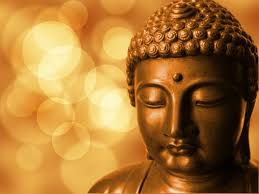
以前このブログでご紹介した、「サピエンス全史」など全世界2000万以上の
ベストセラー作家、ハラル氏にも、絶大な影響をもたらした、S.N.ゴエンカ氏による
「ヴィパッサナー瞑想」の解説本。ブッダの教えが、とてもわかりやすく説明されて
います――バイリンガルで、どうぞ。
This is the commentary book of “Vipassana Meditation” taught by S. N. Goenka, who had
the tremendous influence on Yuval Noah Harari, who is the author of world best-sellers
of over 20 million copies such as “Sapiens: A Brief History of Humankind.” Here what the
Buddha taught is explained very simply――more to come both in English and in
Japanese.
The Buddha did not teach any religion or philosophy or system of belief. He called his
teaching Dhamma, that is, “law,” the law of nature. He had no interest in dogma or idle
speculation. Instead he offered a universal, practical solution for a universal problem.
“Now as before,” he said, “I teach about suffering and the eradication of suffering.” He
refused even to discuss anything which did not lead to liberation from misery.
ブッダはいかなる宗教も哲学も体系的な理念も説かなかった。その教えをダンマと
呼んだが、ダンマとは「法」、すなわち、自然法則にほかならない。ブッダは特定の
教義や無意味な思索には関心を持たなかった。そのかわり、万人が抱える共通の問題を
解決するための普遍的、実践的な方法を提供してくれた。ブッダは「むかしもいまも、
わたしは苦と苦の消滅について説いている」と言う。苦からの解放につながる話で
なければ議論することもひかえたという。
This teaching, he insisted, was not something that he had invented or that was divinely
revealed to him. It was simply the truth, reality, which by his own efforts he had
succeeded in discovering, as many people before him had done, as many people after
him would do. He claimed no monopoly on the truth.
この教えは自分が発明したものでもなければ、神がかりになってひらめいたものでも
ない、とブッダは言う。自分が努力して発見した単純明快な真理であり、自分より前に
多くの人が同じことを発見しており、自分より後にも多くの人が同じことを発見する
だろう、と言っている。真理を独り占めにする気などまったくなかったのである。
Nor did he assert any special authority for his teaching――neither because of the faith
that people had in him, nor because of the apparently logical nature of what he taught.
On the contrary, he stated that it is proper to doubt and to test whatever is beyond one’s
experience: Do not simply believe whatever you are told, or whatever has been handed
down from past generations, or what is common opinion, or whatever the scriptures say.
ブッダは自分の教えが絶対であると断言することもなかった。それは人々が彼を信頼
しきっていたからでもないし、彼の教えが理路整然としていたからというわけでも
ない。むしろブッダは、自分が体験していないものは疑い、検証すべきである、と
述べている。
Do not accept something as true merely by deduction or inference, or by considering
outward appearances, or by partiality for a certain view, or because of its plausibility, or
because your teacher tells you it is so. But when you yourselves directly know,” These
principles are unwholesome, blameworthy, condemned by the wise; when adopted and
carried out they lead to harm and suffering,” then you should abandon them, And when
you yourselves directly know, “These principles are wholesome, blameless, praised by the
wise; when adopted and carried out they lead to welfare and happiness,” then you should
accept and practice them.
「人から聞いたこと、古い言い伝え、世間の常識、あるいは文字になっているもの、
そういうものを鵜呑みにしてはいけない。想像、推測、外見、部分、可能性、あるいは
師の意見、そういうもので教えが真理であると決めつけてはいけない。自分が直接
『この教えは正しくない、間違っている、賢者も批判している。この教えを実行すると
弊害があり、人々が苦しむ』とさとったとき、それを捨てればいい。自分が直接『この
教えは正しい、間違いがない、賢者も賞賛している。この教えを実行すると人々が
豊かで幸福になる』とさとったとき、それを受け入れ、実践すればいい。」
The highest authority is one’s own experience of truth. Nothing should be accepted on
faith alone; we have to examine to see whether it is logical, practical, beneficial.
いちばん確かなことは、自分自身が真理を体験することである。なにごとも、ただ素直
に受け入れればよいというものではない。筋道が通っているか、現実に即しているか、
人々の幸せにつながるか、そういうことを調べてみる必要がある。
Nor having examined a teaching by means of our reason is it sufficient to accept it as
true intellectually. If we are to benefit from the truth, we have to experience it directly.
Only then can we know that it is really true.
また、ひとつの教えを頭で理解しただけで真理とみなしてしまうのも片手落ちである。
その真理からなにか得るものがあるというのなら、それを自分で直接体験してみる必要
がある。そうしてはじめて、ほんとうの真理を知ることができる。
The Buddha always emphasized that he taught only what he had experienced by direct
knowledge, and he encouraged others to develop such knowledge themselves, to
become their own authorities: “Each of you, make yourself an island, make yourself your
refuge; there is no other refuge; Make truth your island, make truth your refuge; there is
no other refuge.”
ブッダはいつも、自分は自分が直接体験したことだけを説いている、と強調している。
そして人々にも同様に、自分の体験から得た知識をよりどころにせよ、と説く。「一人
一人が自分の島になりなさい、自分の避難所になりなさい。それ以外に避難場所は
ない。真理を自分自身の島にしなさい、真理を自分のよりどころにしなさい。それ以外
によりどころはない」
■プライバシー・ポリシー
当ブログは、Amazon.co.jpを宣伝しリンクすることによってサイトが紹介料を獲得
できる手段を提供することを目的に設定されたアフィリエイト宣伝プログラムである、
Amazonアソシエイト・プログラムの参加者です。このプログラムにおいて、
第三者がコンテンツおよび宣伝を提供し、ユーザーからの情報を収集し、訪問者の
ブラウザーにクッキーを設定することがあります。プログラムにおいて情報の
扱いについてはAmazon.co.jpプライバシー規約をご確認ください。
Amazon.co.jp ヘルプ: Amazon.co.jp プライバシー規約

